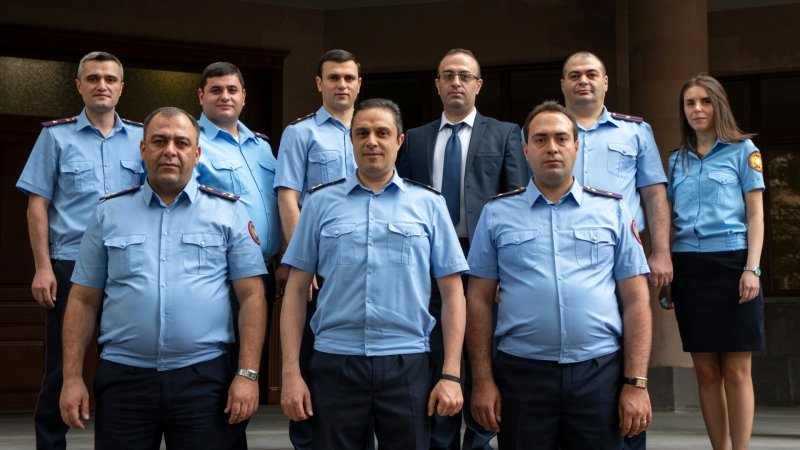CyberEast Interview: On the Work of the New Department for Investigation of Cybercrimes and High Technology Crimes (DICHTC) within the Investigative Committee of Armenia

CyberEast Interview: On the Work of the New Department for Investigation of Cybercrimes and High Technology Crimes (DICHTC) within the Investigative Committee of Armenia
The CyberEast project, funded by the European Union and the Council of Europe and implemented by the Council of Europe through its Cybercrime Programme Office (C-PROC) based in Bucharest, Romania aims to support cyber resilience of the Eastern Partnership countries. The project builds on previous capacity building efforts in the Eastern Partnership region and on the good cooperation relationships developed along the years. What is less brought to the foreground, however, is the human factor and the work of individuals driving the progress forward in the country. In this interview you can meet Robert Adilkhanyan, from Armenia.
C-PROC: Please introduce yourself and the work that you do. What are the reasons for your interest in the area of cybercrime?
Robert Adilkhanyan: I am the Head of the Department for Investigation of Cybercrimes and High Technology Crimes of the General Department for Investigation of Special Important Cases within the Investigative Committee of the Republic of Armenia and I have 8 years of working experience in this field. Currently, the staff of our Department amounts to 8 investigators and 1 expert-specialist for criminological assistance. The department I am leading was established due to the growing number of cybercrimes and high-tech crimes and the necessity to improve the efficiency of their investigation. The Investigative Committee tackles 98-99% of criminal cases in this area, with the exception of criminal cases on crimes against national security, which are investigated by the Investigation Department of National Security Service.
I have to admit that I started working in this field by chance. I did not have any special training in the technical field; as an investigator I was involved in the investigation of crimes against property. The story of my appearance in cyber-tech field starts in 2012, when I was investigating a criminal case on fraud. During the investigation, it became clear that the crime was committed using a computer system, but the criminal case was initiated as a common fraud. This fact interested me and I studied the official statistics of computer crimes. As a result, I was surprised to find out that criminal cases on crimes committed in this area are almost never prosecuted or investigated. My more in-depth study indicated that instead of cybercrime, these cases were classified as common fraud, theft and forgery. After that, the issue was discussed with the Investigative Committee and the Police leadership, and the necessary research and corrections were made in the work. Also due to this fact the number of reported cases on cybercrime has been growing year by year since 2013.
Together with several investigators who joined me, we decided to unite our efforts to bring the industry out of the shadows and to fight cybercrime effectively. Participating in the EAP II and EAP III joint projects funded by the European Union and the Council of Europe and implemented by the Council of Europe through its Cybercrime Programme Office (C-PROC) since 2015 greatly helped us.
Currently, the Government’s attention is greatly focused on this field. Now, having a specialized unit, resources and a clear idea of what to do next, we are effectively fighting against cybercrime.
C-PROC: Following the change of government and subsequent elections in Armenia in the course of 2018, there have been numerous reforms implemented in the public sector. What was the particular reform that the Investigative Committee of Armenia has undergone in this period, especially in relation to cybercrime?
R.A.: One such reform, based on the decision of the Government of the Republic of Armenia, on 23 September 2019, was the establishment of a new highly specialized cybercrime investigation department – the one that I am leading now – the Department for Investigation of Cybercrimes and High Technology Crimes (DICHTC) within the Investigative Committee of the Republic of Armenia. Prior to that, such cases were investigated by individual investigators. As mentioned before, the growing number of cybercrimes and high-tech crimes, as well as the need to use professional potential to obtain electronic evidence during criminal proceedings made it necessary for such a department to be put into place.
The DICHTC’s activity is highly comprehensive, with several main directions of activity. One of them is investigation of cybercrimes and high-tech crimes, including theft (fraud) and other financial crimes committed with the use of Internet and computer systems. The plan is that, after certain retraining, the investigators will be highly specialized. Also, through our Department support to all subdivisions of the Investigative Committee is offered for the examination of computer systems, implemented through the laboratory of the Department. We also provide international cooperation to obtain electronic evidence on criminal cases investigated by all subdivisions of the Committee (including through sending and receiving inquiries to the competent authorities and ISPs of other states, seeking at the same time to improve and develop the cooperation between state and private sectors), as well as training, retraining and training of trainers (ToTs) of relevant investigators of the Committee on cybercrime cases and how to obtain electronic evidence. We also prepare methodological guidelines and examination methodology, and implement activities related to the development of legislative reforms, legal and normative-legal acts. Our colleagues also work on organizing and implementing activities on prevention of cybercrime and high-tech crimes on cyber hygiene. Within each of the mentioned directions, our new Department has concrete and tangible progress and results – at the same time, there is still a lot to do.
C-PROC: How much of an impact did the COVID-19 pandemic have on the cybercrime situation and cybersecurity in Armenia, in your opinion?
R.A.: The COVID-19 pandemic has led to an increase in cybercrimes and other related crimes. Particularly cases of theft of money by fake users under the pretext of providing assistance to citizens. These criminals often use fake social media pages opened in the name of various distinguished public figures. Fundraising as if for providing assistance to injured citizens is another COVID-19 related cybercrime, as are cases on spreading fake, misleading and panic-inducing news messages about the pandemic through social media.
At the moment, the Department is monitoring these issues, and statistical analysis will follow in order to draw the bigger picture of the COVID-related threats and dangers of this type of criminal cases and of the real scale of such phenomena. In any case, this issue is under the attention of RA state bodies and rapid action is taken against any unlawful incidents related to the COVID-19 pandemic.
As for the investigation of criminal cases, the COVID-19 pandemic has created some obstacles for a number of investigative actions, for example, interrogation of witnesses and victims, conducting of searches.
C-PROC: Are there any legal reforms planned and ongoing in Armenia in relation to cybercrime in particular, perhaps in the framework of the draft Code of Criminal Procedure?
R.A.: The adoption of the new Criminal Procedure Code of the Republic of Armenia during this year envisages the procedures related to the receipt of electronic evidence.
C-PROC: Is there anything that the joint European Union/Council of Europe project CyberEast can do to support your work and make a difference in Armenia?
R.A.: It should be noted that the EU/CoE Cybercrime project is the main international partner of the Armenian law enforcement agencies in this field, and the changes that are made now and those that are planned for the future are implemented with its effective support. In addition to the regular work carried out through the project, there are several other important areas where a focus would be beneficial, such as: the training and retraining of investigators, including the acquisition of technical knowledge, and the methodology of cybercrime investigations together with the provisions of guidelines (preferably translated into Armenian). This would include training on financial cybercrime, money laundering, detection and seizure of assets in other countries or converted into crypto-currencies. I see it of particular importance to have access to materials regarding skills development for obtaining electronic evidence and materials on cyber hygiene. With the help of such materials retraining programs for a large number of investigators would be prepared.
Another point is regarding the decision of the Cybercrime Convention Committee (T-CY), of December 2018, on the establishment of the second additional 24/7 National Point of Contactin the RA Investigative Committee. So far it has not been implemented, which causes problems during the process of conducting international surveys. Therefore, in the context of international cooperation, we expect that the work of this second National Point of Contact would begin.
Next, before the adoption of the new Criminal Procedure Code of the Republic of Armenia, we expect the position of T-CY experts regarding the definition of electronic evidence and related procedures in compliance with the Budapest Convention on Cybercrime.
Finally, as quite often people become victims of a cybercrime due to the lack of basic knowledge and awareness about the various dangers existing online, a part of the solution to the problem could be the accreditation of specialized journalists at national seminars, regional and international meetings, so that these events would be covered in the media, thus raising the awareness of the general population on the characteristics of cybercrimes, existing threats and dangers. At the same time, these journalists would also specialize on certain issues of the cybercrime field. Such specialized journalists, in cooperation with representatives of law enforcement agencies could then put together articles, social advertisements and other materials that would contribute to awareness raising for the general public. I would like to see within the framework of the CyberEast project an agreed format for the participation of individual media representatives, as well as for the organizing of events designed to raise awareness of the general public on cybercrime-related matters.

